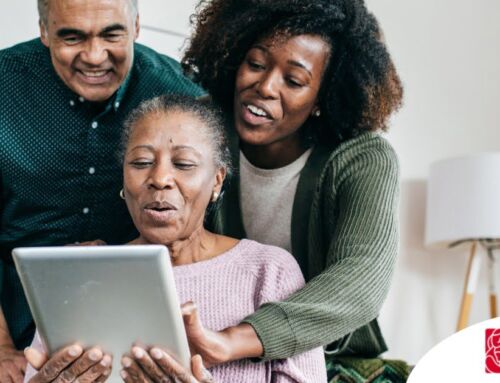Often times, when we think “Medical Alert Systems”, we think of that commercial from the 1980’s in which an elderly woman falls and desperately cries out, “I’ve fallen and I can’t get up!”. What a frightening message. It’s true that as we and our parents age, we worry about their safety, especially if they have chosen to “age in place”. (For more information on aging in place, click Age In Place – What Does It Mean?) But what are these systems or devices? Is it just older people who need them? And what systems are the best?
What is a Medical Alert System or Device?
A medical alert system or device, also known as personal emergency response system (PERS) is a communication tool that when activated connects with trained agents to determine the type of emergency and whose job it is to contact the needed emergency response teams. These teams could be the police, the fire department or medical personnel. The systems can also be personalized when set up to contact people such as family members or loved ones in the case of an emergency.
What Types of Systems Exist?
Medical alert devices have come a long way from the days of the bulky and heavy fob that is worn around the neck. Devices can be small pendant necklaces or watches or bracelet styles. Here are the main types of systems available:
Home Based Medical Alert Systems
These systems are set up in the home and have a base station along with a wearable, either a necklace or bracelet. They have microphones and 2-way speakers and once the button is pressed, the wearer is connected to a trained monitoring agent who will determine the next best course of action. When appropriate, the agent will contact emergency services or a loved one or family member.
A home based system is just that, to be used only in the home. For someone who is homebound or subject to special needs when in the home and for home safety, these are ideal. For people on the move, a mobile response system is best and can also be used in the home.
Mobile Alert Systems
A mobile alert system is perfect for anyone who is mobile and active. They don’t require a home base terminal and are wearables, such as bracelets, watches or necklaces. The best mobile systems will include:
- Built-in cell service – these devices run on their own cell connection and are not dependent on having a cell phone or landline nearby
- GPS tracking – emergency services can locate the wearer anywhere
- Fall detection technology – activates automatically if the wearer falls
- Waterproof – can be worn in the shower, while swimming or vacationing
Who Benefits From Medical Alert Systems?
Not just for seniors, there are many people who would feel more peace of mind ensuring the safety of a loved one who:
- Requires assistance with walking
- Is prone to tripping or falling
- Has an ongoing or acute medical condition or had a major health incident, such as stroke
- Has a chronic condition such as arthritis, COPD, epilepsy, Alzheimer’s, diabetes or high blood pressure
- Has severe allergies
- Needs daily homecare (caregivers need break periods or may be in a different part of the home when an emergency occurs)
- Has children in the home (babysitters or older children can be instructed on proper use)
- Lives alone or works (or commutes) alone, especially at night
Having access to fire, police and emergency services at the touch of a button, especially with a system that provides GPS, gives extra security and protection.
What Kind of System is Best?
In this day and age of smartwatches and FitBits, many folks are used to wearing some type of health device. To determine what type of alert system or device is best for your loved one, there are a number of things to consider:
- Which features are most important?
- What do you need the system to do? (Locate your loved one? Detect movement or falls? Send medication reminders?)
- Will the wearer be mobile or home based?
- Is the wearer comfortable with technology?
- Does the company who offers the system have a free-trial period (with full refund) if it doesn’t work out?
- Who would need to be contacted in case of emergency? “Monitored” services are monitored by trained agents 24/7 and “Non-Monitored” services will contact a family member, but not the police, fire department or medical personnel.
- Cost versus features and benefits and cancellation policies
To read more about what brands are available and what the costs are, read more here.
~ ~ ~
Do you have questions about how you can better support your loved one while they age in place in South Florida? Please contact CareGivers of America here: Contact or call us toll free: 800-342-4197
*This post is not sponsored, but may contain external links to websites, articles or product examples. External links are used for example or refence purposes only and these links do not indicate specific product or website endorsement by CareGivers of America.







